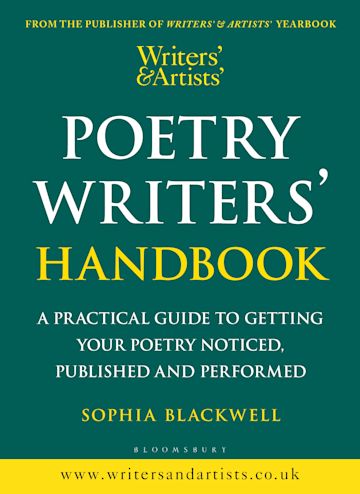Sophia Blackwell recalls Edinburgh Fringe memories before sharing an extract from the Poetry Writers' Handbook that's all about turning poetry into a production.

The Edinburgh Fringe is upon us again. My first Fringe was over a decade ago, in the Banshee Labyrinth, a giant, sticky Goth pub off the Royal Mile which smelled indelibly of sweat and Buckfast. I did my first show as a two-hander with a friend, which I’d recommend. She either sofa-surfed or camped outside of town, while I shared with a comedy troupe of sixteen middle-class boys who ate crisps in the toilet and fell out acrimoniously towards the end of their run. It was like being in the middle of a very large divorce. My highlights of the summer were when the fire alarm went off during the show and my friend improvised a rap over the top of it, and a very earnest youth theatre group from Godalming doing a musical about genocide. I can still sing most of the songs. The Fringe offers the very best of arts and culture, from actors, artists, authors, dancers and everything else in between.
But if poetry is your thing, here's some of my advice on how to turn your poetry into a production from The Poetry Writers' Handbook:
Time for a fifty-minute fringe show. If that feels daunting, rope in a friend or two. You can do Edinburgh or Brighton or Camden Fringe together, and you’ll make some shared memories as well as have trusted friends to help with the leaflet printing, legwork and emotional support. You might also want to perform draft or ‘scratch’ versions of the show in pub rooms and theatres around town and ask friends to write down feedback and leave it in a box or on a table. Not everyone wants feedback after a short performance because if something didn’t work, you’ll know about it – but a longer show requires more honest input, so don’t be afraid to ask.
When you’ve done a couple of full-length shows on your own, think about a theatre show. You’ll need more friends, more skills, and probably some funding, as well as a marketing plan that’s well thought out and supported by you or a friend who’s a whiz at this sort of thing – you can’t rely on the venue alone. When putting together something as ambitious as a one-person show, you may need help with tech, lighting, sound and publicity so make sure to work as closely as you can with the venues, even when you are on tour.
 In a full-length show, you can also start bringing in some other aspects of yourself that you may not have been able to use in your more portable poetry performances so far. If you also do theatre, dance, music, burlesque, magic, drag or comedy, now’s the time to lean into those skills and mix it up. At some point, you may feel as though you have entirely crossed over into theatre, and that may be the case – spoken word is often marketed as raw and authentic, and you might not be feeling that when you’ve put together something as slickly produced as any cabaret show, but it does open up other opportunities.
In a full-length show, you can also start bringing in some other aspects of yourself that you may not have been able to use in your more portable poetry performances so far. If you also do theatre, dance, music, burlesque, magic, drag or comedy, now’s the time to lean into those skills and mix it up. At some point, you may feel as though you have entirely crossed over into theatre, and that may be the case – spoken word is often marketed as raw and authentic, and you might not be feeling that when you’ve put together something as slickly produced as any cabaret show, but it does open up other opportunities.
Examples of spoken word and storytelling theatre shows that I have seen at past Fringes and beyond include:
- Raising Lazarus by Kat François: The performance poet, Slam champion and dancer explores the legacy of Caribbean soldiers, including her ancestors.
- Shame by John Berkavitch: With interludes of street-dance, a young man reflects on shameful situations in his life, ranging from the comic to the tragic.
- Kevin, King of Egypt by Rob Gee: Former psychiatric nurse Rob Gee uses his professional knowledge in this story of a delusional inpatient who escapes the hospital to fulfil his destiny as king of Egypt.
- Whenever I Get Blown Up, I Think of You by Molly Naylor: Naylor recalls the 2005 London bombings, in which she and her partner were caught up, and the effect it had on their relationship.
- Silence by Rachel Rose Reid: This Scandinavian-influenced legend tells a story set in pre-Arthurian England and France. Princess Silence is raised as a male warrior and goes on various quests.
- The Rebel Cell by Dizraeli and Baba Brinkman: An anarchist and a gadfly journalist conduct one last interview in jail, reflecting on their past friendship and changing values.
These descriptions have been kept purposefully short, but you can see from them how a fully realised spoken word or storytelling show requires more than a fifty-minute collection of the poet’s greatest hits. That rough-edged but flexible style of putting together longer-form shows has been replaced by a modulated, theatrical approach that relies more on narrative, research and a strong central concept that can be expressed succinctly in the show’s publicity and marketing material.
When your full-length show is in a festival or theatre programme, you may even factor its potential commercial success into the fabric of the show. Most performers don’t go this far and as you can see from the list above, they often prefer to explore a personal passion or moment of crisis in their more complex shows, but here’s an example of how a performer can use practicalities to ensure success through actual market research and observation. One actor, David William Bryan, noticed that the Edinburgh Fringe was jam-packed with young university drama troupes performing challenging, surreal and intellectual plays. Finding out that his slot in the theatre was in the early afternoon and that the older ‘tourists with sandwiches’ crowd who arrived in the city at that time were not being catered for by the plays on offer at that time of day, the actor researched a relative who had fought in World War II, and told his story in a one-man show, In Loyal Company. The show was a challenge to put together with lots of detail to research, but – combined with a comprehensive social media push – it was a smash hit...
The Edinburgh Fringe is the place where I’ve experienced dizzying highs, soul-crushing disappointments and sweaty costumes, stodgy snacks gulped in an alleyway. It isn’t where I made my career, but it is the kiln where part of me as a performer was fired and hardened, and that stayed with me forever.
This article is an abridged extract from the Poetry Writers' Handbook, available to pre-order at Bloomsbury.com.
Photo by Samantha Gades on Unsplash
Sophia Blackwell is a performance poet with three published collections of poetry and the author of a novel. Her poetry has been anthologised by Bloodaxe, Nine Arches and the Emma Press among others, and between Autumn 2019 and and 2021, she hosted the LGBT+ radio show Out in South London on Resonance FM, showcasing gay, lesbian, bisexual and trans authors, musicians, comedians and other creatives like her.
Recent notable gigs include four times at Glastonbury on the Poetry & Words Stage, Women of the World (WOW) Festival at the South Bank Centre and headlining a national tour with Hammer and Tongue. She is a Literary Death Match champion, Spread the Word LGBT Hero and Diversity Role Model. She was the Former Chair of Poetry London and is a freelance editor and the current Chair of the Pride Network at Hachette UK.
Comments